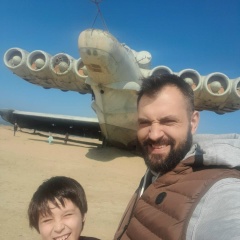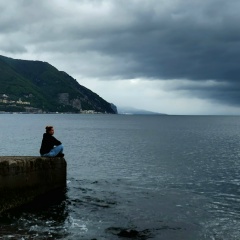Виктор Франкл написал «Несмотря ни на что, сказать жизни «Да»: Опыт психолога в концлагере» в 1945, вскоре после освобождения. База последующего психотерапевтического метода доктора — искать смысл во всех проявлениях жизни, даже самых страшных, тем самым создавая стимул к продолжению жизни.
Сегодня я побывала в БДТ на предпремьерном показе спектакля «Человек» Томи Янежича, в основу которого легла книга Франкла. За 3,5 часа зрителя погружали в тонкости будней узников Аушвица и Дахау с позиции внутренних переживаний, мотивов поступков: о чём думали и что чувствовали люди в условиях фатальных селекций, изнутрительной работы, регулярных унижений; как переживали голод, откуда брали силы. Постановка не похожа на «холокост-арт» (так выражаются мои приятели-иностранцы, имея в виду паразитизм на теме). Здесь нет атрибутов мучений, кроме эмоций и метафор. Это интерактивное чтение книги. С отсылками к настоящему: человек привыкает к чужим страданиям — мы смотрим новости из Украины и Сирии, поедая свой ужин, как узник Аушвица спокойно допивает суп, слыша как бьётся голова его товарища, когда его тело волочат по ступенькам. В действии показаны наименее осмысленные искусством моменты, к примеру, возращение из концлагеря домой.
Тема свободы внешней венчается вопросом внутренней свободы: «Так что же такое человек? Это существо, которое всегда решает, кто он. Это существо, которое изобрело газовые камеры. Но это и существо, которое шло в эти камеры, гордо выпрямившись, с молитвой на устах». По-моему, успех искусства — когда люди выходят после спектакля и светятся, чего удалось добиться Томи Янежичу в этом сложном контексте.
http://bdt.spb.ru/%D1%81%D0%BF%D0%B5%D0%BA%D1%82%D0%B0%D0%BA%D0%BB%D0%B8/%D1%87%D0%B5%D0%BB%D0%BE%D0%B2%D0%B5%D0%BA/
#бдт #человеквбдт
Сегодня я побывала в БДТ на предпремьерном показе спектакля «Человек» Томи Янежича, в основу которого легла книга Франкла. За 3,5 часа зрителя погружали в тонкости будней узников Аушвица и Дахау с позиции внутренних переживаний, мотивов поступков: о чём думали и что чувствовали люди в условиях фатальных селекций, изнутрительной работы, регулярных унижений; как переживали голод, откуда брали силы. Постановка не похожа на «холокост-арт» (так выражаются мои приятели-иностранцы, имея в виду паразитизм на теме). Здесь нет атрибутов мучений, кроме эмоций и метафор. Это интерактивное чтение книги. С отсылками к настоящему: человек привыкает к чужим страданиям — мы смотрим новости из Украины и Сирии, поедая свой ужин, как узник Аушвица спокойно допивает суп, слыша как бьётся голова его товарища, когда его тело волочат по ступенькам. В действии показаны наименее осмысленные искусством моменты, к примеру, возращение из концлагеря домой.
Тема свободы внешней венчается вопросом внутренней свободы: «Так что же такое человек? Это существо, которое всегда решает, кто он. Это существо, которое изобрело газовые камеры. Но это и существо, которое шло в эти камеры, гордо выпрямившись, с молитвой на устах». По-моему, успех искусства — когда люди выходят после спектакля и светятся, чего удалось добиться Томи Янежичу в этом сложном контексте.
http://bdt.spb.ru/%D1%81%D0%BF%D0%B5%D0%BA%D1%82%D0%B0%D0%BA%D0%BB%D0%B8/%D1%87%D0%B5%D0%BB%D0%BE%D0%B2%D0%B5%D0%BA/
#бдт #человеквбдт
Victor Frankl wrote “No matter what, say Yes to Life: The Psychologist's Experience in a Concentration Camp” in 1945, shortly after his release. The basis of the doctor’s subsequent psychotherapeutic method is to search for meaning in all manifestations of life, even the most terrible ones, thereby creating an incentive to continue life.
Today I visited the Bolshoi Drama Theater at the pre-premiere show of the play “The Man” by Tomi Yanezhich, which was based on Frankl’s book. For 3.5 hours, the viewer was immersed in the intricacies of everyday life of the prisoners Auschwitz and Dachau from the perspective of inner experiences, motives of actions: what people thought and felt in conditions of fatal selection, exhausting work, regular humiliation; how they experienced hunger, from where they took strength. The production is not like "Holocaust art" (as my foreign friends are expressed, referring to parasitism on the topic). There are no attributes of torment, except emotions and metaphors. This is an interactive book reading. With references to the present: a person gets used to the misery of others - we watch the news from Ukraine and Syria, eating our dinner, as the prisoner Auschwitz calmly finishes his soup, hearing his comrade’s head beating when his body is dragged along the stairs. The action shows the least meaningful art moments, for example, returning home from a concentration camp.
The theme of external freedom is crowned with the question of internal freedom: “So what is a man? It is a creature that always decides who it is. This is the creature that invented the gas chambers. But this is the creature that walked into these cells, proudly straightening up, with prayer on its lips. " In my opinion, the success of art is when people go out after the performance and shine, which Tom Yanezhich managed to achieve in this difficult context.
http://bdt.spb.ru/%D1%81%D0%BF%D0%B5%D0%BA%D1%82%D0%B0%D0%BA%D0%BB%D0%B8/%D1% 87% D0% B5% D0% BB% D0% BE% D0% B2% D0% B5% D0% BA /
# bdt # people
Today I visited the Bolshoi Drama Theater at the pre-premiere show of the play “The Man” by Tomi Yanezhich, which was based on Frankl’s book. For 3.5 hours, the viewer was immersed in the intricacies of everyday life of the prisoners Auschwitz and Dachau from the perspective of inner experiences, motives of actions: what people thought and felt in conditions of fatal selection, exhausting work, regular humiliation; how they experienced hunger, from where they took strength. The production is not like "Holocaust art" (as my foreign friends are expressed, referring to parasitism on the topic). There are no attributes of torment, except emotions and metaphors. This is an interactive book reading. With references to the present: a person gets used to the misery of others - we watch the news from Ukraine and Syria, eating our dinner, as the prisoner Auschwitz calmly finishes his soup, hearing his comrade’s head beating when his body is dragged along the stairs. The action shows the least meaningful art moments, for example, returning home from a concentration camp.
The theme of external freedom is crowned with the question of internal freedom: “So what is a man? It is a creature that always decides who it is. This is the creature that invented the gas chambers. But this is the creature that walked into these cells, proudly straightening up, with prayer on its lips. " In my opinion, the success of art is when people go out after the performance and shine, which Tom Yanezhich managed to achieve in this difficult context.
http://bdt.spb.ru/%D1%81%D0%BF%D0%B5%D0%BA%D1%82%D0%B0%D0%BA%D0%BB%D0%B8/%D1% 87% D0% B5% D0% BB% D0% BE% D0% B2% D0% B5% D0% BA /
# bdt # people

У записи 35 лайков,
7 репостов.
7 репостов.
Эту запись оставил(а) на своей стене Ольга Полякова























































